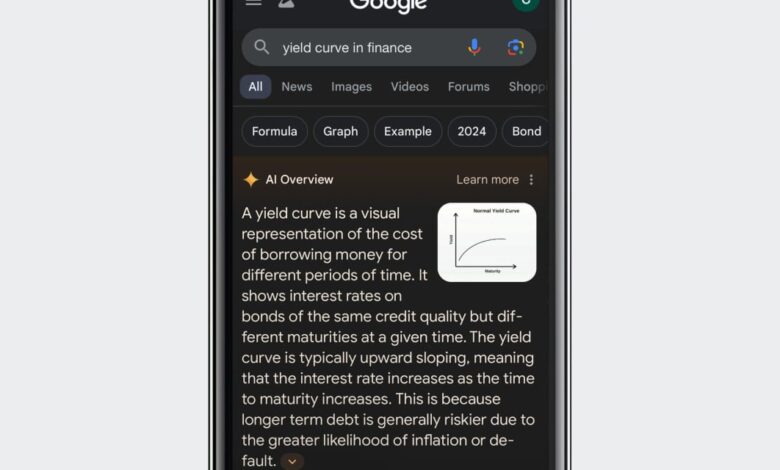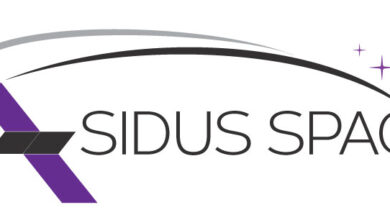AI Search Gives Google a New Way to Make Money—or to Lose Ground to Competitors

I don’t know everything about search engine optimization. Or anything. But if looking up heavily searched terms on Google Trends and placing them high in this column can’t make me popular online, then my name isn’t Timberwolves Kate Middleton Nvidia Survivor Finale.
Or maybe it’s too late for that sort of thing. Alphabet says it’s now integrating generative artificial intelligence into its core search business. That could change the rules of getting noticed online—rules that audience engagement experts have carefully explained to me over the years while I pretended to pay attention. Something about an algorithm, relevance ranking, and clicks. With AI, clicks might become less important. Google says they won’t, but I wonder if it’s talking out of both sides of its Google hole. More on that in a moment.
Let’s start with a totally random search example: a user asking which sneakers are best for a 51-year-old man who has been told he looks like a cross between a fat Peyton Manning and Hank from the King of the Hill cartoon. This is Google’s bread and butter. At the top of its results are paid links, in this case product listings with pictures and prices, starting with something called RetroDay Shoes by BYLT Premium Basics, for $84. Last quarter, Google parent
booked just over $80 billion in revenue, more than three-quarters of it from advertising.
Now look at results for that search at Perplexity.ai, one of a handful of tiny start-ups that are taking on Google’s near-monopoly in search. There are bullet points on how this user can best “complement his mature style,” with an emphasis on cushioning and avoiding flashy colors, and some specific model recommendations, but no endless list of links, paid or not.
I’m not sure which is better. Google’s pictures seem helpful, but with Perplexity, I’m getting answers, not a pitch. I suppose it depends on the circumstance and the user. Some people like to browse. Others just want to get through their to-do list. Perplexity’s standard search service is free. For $20 a month, there’s a pro version that lets users choose their AI model, upload and analyze files, generate images, and more.
Advertisement – Scroll to Continue
Some searches pay off more for the content ecosystem than for Google. I typed in, “how will ai affect google’s profitability in search,” and the result was a list of links to news articles. Publishers make ad money from users visiting those articles. Some sell subscriptions. Many get more traffic from the side door of search than from their own home pages.
I typed the same thing in at Perplexity, and instead of links, I got bullets explaining the opportunities and risks for Google: By integrating AI, it can defend its search business against insurgents, and perhaps even charge premium prices for smarter ads. But if AI reduces clicks, and thus advertising volume, Google might have to charge for search.
“Things are changing so fast that it’s hard to predict exactly what’s going to happen,” says Brent Thill, who covers Alphabet and other internet giants for Jefferies. “We know what it’s going to look like this year, and Google will be just fine. But I think three years from now it could look radically different.”
Advertisement – Scroll to Continue
Search in the future could run more through voice requests and pop-up assistants and less through traditional search bars, says Thill. “You may not even know that you’re going to Google,” he says. That could provide the best opportunity in decades for new players to gain share. The task for Google is to keep up in AI without giving away its search economics.
For now, that involves what Google calls AI Overview, powered by its Gemini generative-AI platform. It looks a bit like traditional search results wearing a Perplexity hat. Queries bring up explainers first, followed by story links, display ads, and other familiar results.
“Our custom Gemini model can take the legwork out of searching,” the company wrote in a recent blog post. With AI Overview, it explained, users search more, click more, and are more satisfied. “We’ll continue to focus on sending valuable traffic to publishers and creators,” it added.
But clicking around the internet for answers sounds a lot like the traditional “legwork” of search. So it’s unclear how you get less legwork but more clicks. Perhaps Google will be able to tell when users just want Perplexity-like answers, and when they are in the mood to browse. Publishers will have to adjust. Charging to feed AI is one option. This past week,
owner of The Wall Street Journal and Barron’s, announced a content-licensing deal with OpenAI.
Alphabet stock trades at 23 times this year’s projected earnings. More than three-quarters of analysts who cover it say to buy. For some of them, it comes down to the company’s membership in a small group of internet players with a shot at AI dominance. “You need users, you need data, and you need capital,” says Thill at Jefferies. “And there are only four companies on the planet that have it. So, for the enterprise, we like
and
Amazon
,
and for the consumer market, we like
Advertisement – Scroll to Continue
and Alphabet.”
Alphabet has done a poor job of communicating its AI prowess. Last year, the company tweeted a video of its chatbot Bard answering a question about the James Webb Space Telescope—incorrectly, it turned out. One commenter called it “[bull—] as a service.” The stock lost 7% in a day.
Advertisement – Scroll to Continue
“The product is probably a lot further ahead than the perception,” Thill says of Google’s new AI rollout. But he also says that although the AI boom is already here for chip makers, it could take longer than expected for applications. “Remember Clippy, the paper clip from Microsoft?” he says. “We’ve heard of customers that have been deactivating Microsoft Copilot from their desktops because it’s annoying.”
Maybe traditional search has legs, and there’s still time to learn to game it for clicks—or my name isn’t Taylor Swift Ozempic Roblox.
Write to Jack Hough at jack.hough@barrons.com. Follow him on X and subscribe to his Barron’s Streetwise podcast.



